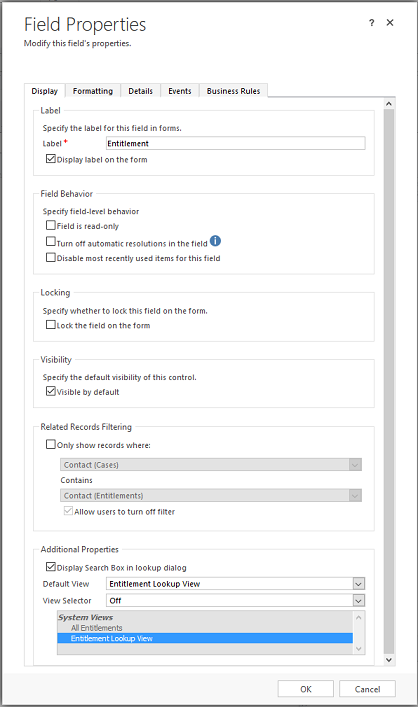Overview of the special field properties of a form
All fields have the properties listed in Common field properties, but certain fields have additional properties, such as this entitlement field that can be opened from the main case form.

Lookup field properties
Note
The options described in the table below are available only for single-entity lookup fields.
| Section | Property | Description |
|---|---|---|
| Related Records Filtering | Only show records where | When this is enabled, the records that display when users search for a record will have additional filtering applied. This helps provide more relevant searches when setting the value of the lookup. By default, this is turned off. The relationship combinations that are possible when you filter related records are listed in the table following this one. The first list is populated with all the potential relationships you can use to filter this lookup. Select one. The second list is then populated with all relationships that connect the related entity (selected in first list) to the target entity. Select one. Select the Allow users to turn off filter check box to give users the option to turn off the filter you define here. When users select the Look Up More Records option while setting the value for a lookup, they see this dialog box.  If you’ve selected the Allow users to turn off filter option while configuring the lookup field, users will see the check box to turn off the filter. This makes it possible for them to see a wider range of records. If you want to make sure that users only see a limited range of records defined by this filter, clear the Allow users to turn off filtercheck box. |
| Additional Properties | Display Search Box in lookup dialog | You can choose not to display the search box in the lookup dialog. |
| Default View | This view iis used to filter the results of the inline search and set the default view shown in the lookup dialog when users select the Look Up More Records option. The default view also controls which fields are included in the inline lookup. For lookups that only allow selection of a single entity type, the fields displayed in the inline lookup are set to be the first two fields included in the default view. In this example, Main Phone and Email are the first two columns in the default view configured for an account lookup. For system lookups that allow for multiple entity types, the first two columns of the entity lookup view are shown. |
|
| View Selector | You can choose from three options: - Off: Don’t allow users to choose a different view. - Show All Views: All views are available. - Show Selected Views: When you choose this option you can use the Ctrl key and your cursor to choose which views to show. The Lookup view for the entity can’t be de-selected. |
*Possible Relationship Combinations
| First list relationship | Second list relationship | Available? |
|---|---|---|
| N:1 | 1:N | Yes |
| N:1 | N:1 | Yes |
| N:1 | N:N | Yes |
| 1:N | 1:N | Yes |
| 1:N | N:1 | No |
| 1:N | N:N | No |
| N:N | 1:N | Yes |
| N:N | N:1 | No |
| N:N | N:N | No |
Two option field properties
On the formatting tab, two option fields have the following formatting options
Two radio buttons: Two labeled controls with labels. Only one may be selected.
Checkbox: A single checkbox to set the true value, otherwise false.
List: A drop-down list containing both values.
Multiple lines of text field properties
Multiple lines of text and single line of text fields that use the Text Area format have a Row Layout property. With this property you can specify a value for Number of Rows or select Automatically expand to use available space.